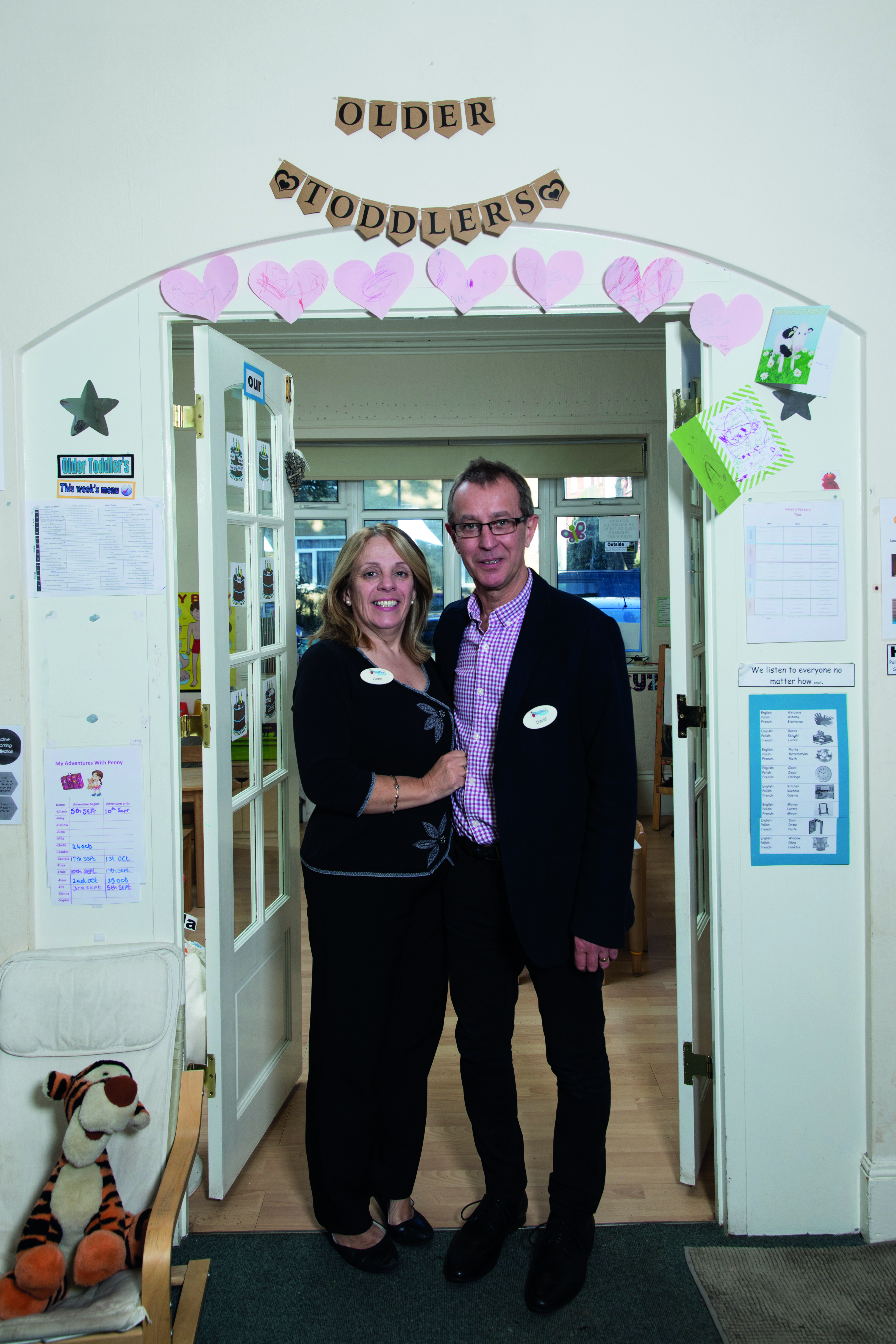
In the first quarter of 2022, childcare and healthcare business broker Redwoods Dowling Kerr (RDK) has transacted a deal a day, which is ‘absolutely unprecedented’, according to sales and marketing director Andrew Steen.
It is a similar picture for property specialist Christie & Co, which has 96 nursery transactions in the pipeline so far this year, made up of single-asset nurseries and small, medium-sized and corporate groups.
‘Looking at our deal progression pipelines for the first half of the year, 2022 could potentially be a record-breaking bumper year in the UK for day nursery business transactions,’ explains Courteney Donaldson, managing director of Childcare and Education. ‘Buyers are scouting for the best opportunities and some deals are being closed in record time of less than eight weeks, as opposed to a normal timetable of six months.’
But despite the positive outlook, operators are facing the daily operational challenges of Covid, workforce fatigue and rising financial costs associated with running their businesses.
THE MARKET RIGHT NOW
Last year saw a raft of private-equity transactions injecting new capital into businesses such as Kids Planet, which is at now at 107 nurseries, and ICP, which has 57 settings.
But despite the uptake, the market still remains fragmented, and there are a considerable number of small groups and single settings that would represent ‘good acquisition opportunities’ to corporate national operators, Steen says.
However, not every nursery is up for sale. In fact, there is significantly more demand than active supply, which is in turn driving up sale multiples. Consolidation is also helping to drive up the price that sellers achieve because supply is becoming restricted.
As the childcare market continues to grow, brokers and property specialists are seeing high levels of completion rates throughout the UK, from small nurseries that have been acquired by corporate operators right through to larger multiple group transactions.
Providers are also expanding their geographical reach by moving into new territories, such as IPC’s first acquisition into the North-West of England with the purchase of Future Champions in Lancashire and Wee Gems Nursery Group in Scotland.
PRESSURE POT
But with Covid rife again at the time of writing, nurseries are facing daily operational challenges with high levels of staff off sick. Fatigue continues to dominate the workforce, with exhausted staff looking to move into sectors that pay the same, or more, but without the added stress levels. Increased financial pressures due to the cost of living are also likely to exacerbate the staffing crisis in the months ahead.
Donaldson says, ‘This general sense of fatigue is also being seen among some nursery owners, who are exiting sooner than they anticipated because they’re either exhausted and need time out, alongside owners being attracted to the high prices that can be achieved for the best quality businesses in the current marketplace.’
Increased operational costs are also having an impact on providers. In order to retain their workforce, some owners have reported increasing staff wages in January, as opposed to April, so they are ‘now playing catch-up with the fee increases’, Donaldson says.
‘The high cost of living, on top of insurance and property costs, is likely to see some owners increase fees by up to 10 per cent this spring, just to simply stand still,’ she adds.

FEE INCREASES
A survey of 1,970 providers by the Early Years Alliance, run in parallel with the Pregnant Then Screwed parent survey, shows that more than a third are planning on increasing their fees this year because Government funding does not cover their costs. Four in ten said they would be raising fees, and 30 per cent said they are operating at a loss.
With the rising cost of living, Steen says operators may find themselves having to provide greater levels of flexibility to support parents in financial distress because, before they know it, their debt could become out of control, which can present a challenge.
Some nurseries have seen a dip in their financial performance over the past two years, but this does not appear to be deterring buyers.
Steen says, ‘It’s a case of explaining the story to the buyers, who in our experience are fully prepared to factor in Covid. We are currently transacting deals where we are achieving prices in excess of 2019.’
MORE CLOSURES TO COME
Although the data on nursery closures in 2022 has not yet been published by Ofsted, Donaldson predicts there will be more closures on the horizon.
‘Data published in Q1 2021 evidenced over 400 nursery closures,’ she says. ‘Although we’re not hearing anecdotally the same volume of closures as last year, they will come. Interest rates have gone up, mortgage payments are increasing for providers on variable rates, heating, electricity and insurance costs have gone up, staff wages will need to increase, and of course in England there is the matter of business rates.’
Information obtained by the National Day Nurseries Association found that 80 per cent of local education authorities in England underspent their early years budget, which includes money for funded places and the Early Years Pupil Premium, in the last financial year.
‘The reality of the situation,’ Donaldson explains, ‘is that if this money had made it to frontline childcare providers, it could have made the difference between them closing due to financial instability, or remaining open.’
‘Further consolidation to come’
 RDK anticipates further consolidation among the top 30 UK childcare providers. The brokerage says it believes this year represents a ‘golden window of opportunity’ and makes a number of market predictions for 2022 in its childcare and education market report, launched in January.
RDK anticipates further consolidation among the top 30 UK childcare providers. The brokerage says it believes this year represents a ‘golden window of opportunity’ and makes a number of market predictions for 2022 in its childcare and education market report, launched in January.
They include more European/global entrants acquiring UK-based providers; private-equity-backed groups continuing to grow; and groups of fewer than five settings expanding their ‘geographical base’.
It also predicts increased deal activity in the North of England, Scotland and Wales and more ‘double digit’ multiples for groups with regional and national scale.
RDK’s Steen says, ‘We expect to see completion volumes continue to accelerate with our deals-a-day coming to fruition in the summer. We fully expect to see consolidation top to bottom, with large groups consolidating. And I think we may see more private-equity investment into the sector. We also believe that there will be a strong appetite from UK lenders to support the sector.’
Key acquisitions
 Since the publication of Nursery Chains in March, there have been some major acquisitions within the corporate sector, and the pace of consolidations continues to drive forward.
Since the publication of Nursery Chains in March, there have been some major acquisitions within the corporate sector, and the pace of consolidations continues to drive forward.
Kids Planet (pictured first right), the third-largest nursery group in the UK, added six new nurseries to its portfolio with the acquisition of Twinkles, which operates across North and West Yorkshire. A few months later, it acquired four new settings – Horn End Nurseries, which operates three settings in Stafford, and separately, The Owls in Bolton – taking its total number of ‘active’ sites to 107.
Since becoming part of La Maison Bleue, The Old Station Nursery group continues to rapidly expand with its purchase of the Townsend group of six nurseries based in Kent, and Good Manors Day Nurseries, which operates four sites in Hampshire. This takes its total number of nurseries to 63.
ICP Nurseries, ranked the tenth-largest in the latest issue of Nursery Chains, has grown to 57 settings with its recent acquisition of Wee Gems Nursery Group, a group of four nurseries in Scotland, and Future Champions, which operates two nurseries in Bolton and Chorley, in Lancashire – its first settings in the North-West.
Speaking about Wee Gems, Jenna Caldwell, director of childcare and education at Redwoods Dowling Kerr, said, ‘We received interest from far and wide, specifically Europe and the UK, but ultimately [the owners] felt that ICP was the perfect fit.’
Thrive Childcare and Education acquired The Village Nursery, a group of eight nurseries and one pre-school in Cheshire and Greater Manchester. The deal means that Thrive now operates more than 40 settings across the North of England and Scotland.
Fennies, which operates across London, Surrey and Kent, has opened two new nurseries, based in Bromley and London, bringing the total number of sites to 15.
In February, Paint Pots (former owners Anna and David Wright pictured) sold its nine nurseries to Launchpad Early Years, a social enterprise with three pre-schools that has a broad Christian ethos similar to church schools. The settings are open to all children of all faiths.
Smaller providers are also actively expanding their portfolios. And since the start of the year, Christie & Co has seen a surge in owners of single-asset settings forging ahead with the sale of their businesses.
Fiona Jones, owner of Sky High Achievers, which has two settings in Greater Manchester, has bought The Bungalow Day Nursery in Manchester, while nursery operators Neil and Marina Sturmey have purchased Rainbows Childcare in Hungerford, Berkshire – their third site.
Meanwhile, the owner of Explorers Day Nurseries, Richelle Cook, has bought Orchid Montessori Nursery in Romford. The 28-place setting is her fourth site and second nursery in Romford. Her other settings are based in Hornchurch and South Ockendon. Together the nurseries provide more than 80 childcare places.
Employee ownership was the way forward for the owner of Kidzcare nursery group in Edinburgh. The business, which turns over £3 million a year and provides care for more than 500 children a day across its four nurseries, breakfast club and after-school clubs, is now fully owned through company shares by its 150 staff.
‘A bumper first half’
 ‘A two-tier market is steadily emerging, evidenced by what buyers are looking for and the tone of prices that they are willing to pay,’ explains Christie’s Donaldson.
‘A two-tier market is steadily emerging, evidenced by what buyers are looking for and the tone of prices that they are willing to pay,’ explains Christie’s Donaldson.
‘You could have two nurseries, both generating £50,000 pounds worth of earnings. But if one is more desired by seasoned acquirers because of its location, configuration and the fact that its physical building and legal rights of occupation are more future-proofed, that one will achieve a higher value than the nursery that doesn’t exhibit those attributes,’ she adds.
Donaldson also predicts that the market will continue in its current state into Q2 and, after that, due to the sheer volume of activity expected during the first half of the year, if group providers focus their efforts on integrating newly acquired nurseries, there might potentially be some slowdown from the most prolific acquirers.
She says, ‘Getting to know staff teams, the parents they’re serving and getting the right post-acquisition infrastructure in place is very important to group providers when making multiple acquisitions. They don’t want to be in a position where they get the integration wrong.’
Real-estate developers will increasingly seek land suitable for organic nursery developments in housing estates and commercial developments, but Donaldson says operators are ‘mindful’ that it can take up to three years for a new, organically developed business starting from scratch to achieve maturity.
‘Going into a brand new purpose-built nursery, with all the operating cost pressures and trying to recruit staff to open a nursery from a standing still position at the moment, is tough.’
But Donaldson says it will be the most active Q1 and Q2 the sector has seen for a long time. ‘I don’t know what Q3 and Q4 will bring, but I think, essentially, we could see a bumper period up to half year,’ she enthuses.
MORE INFORMATION
- RDK’s childcare and education market report: https://bit.ly/3K1KVsC
- Christie & Co’s Business Outlook 2022 report: https://bit.ly/3tWOj2o
- NDNA report on nursery closures: https://bit.ly/3uFObTS
- Early Years Alliance Survey: https://bit.ly/36G0cRD









